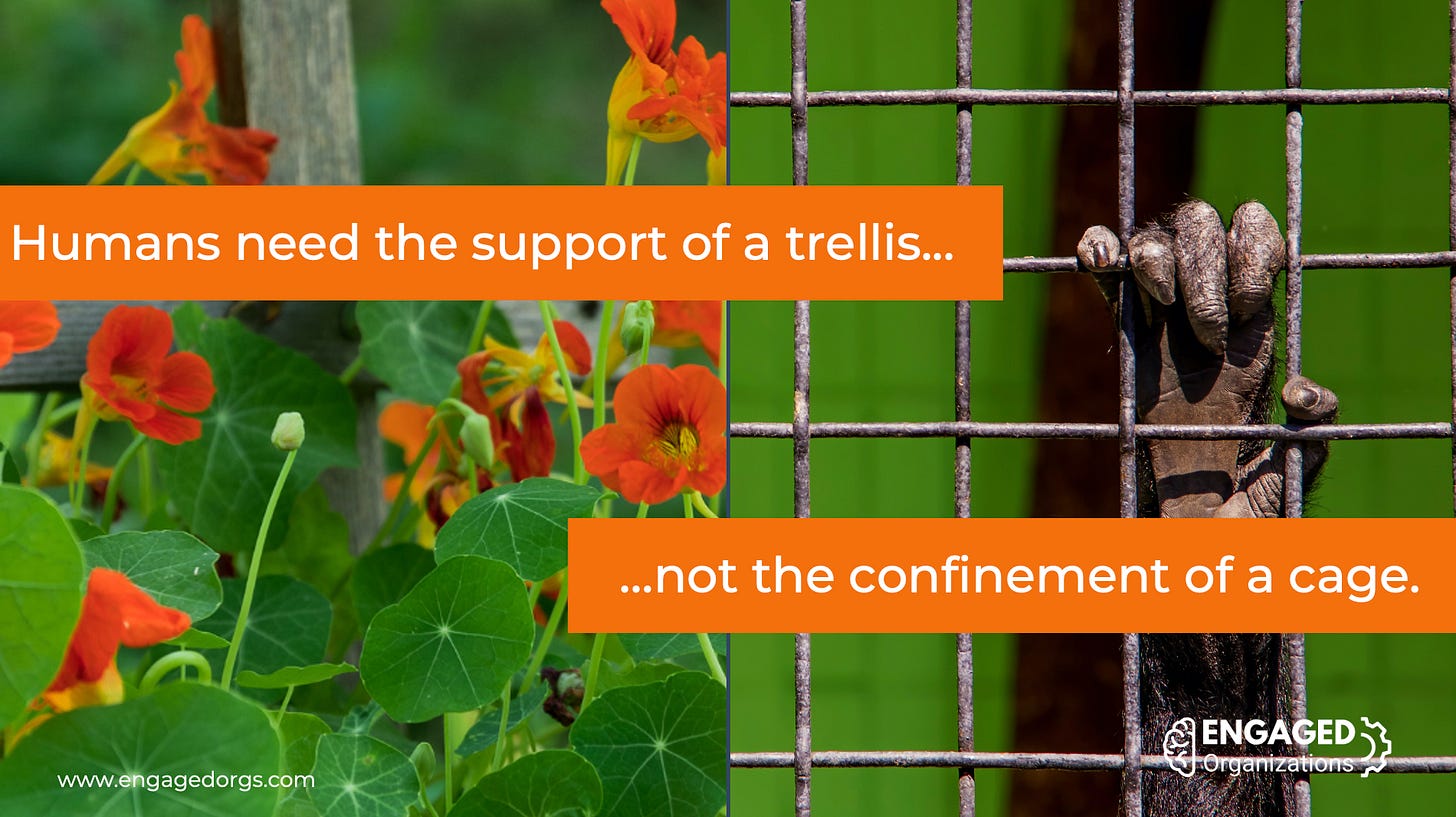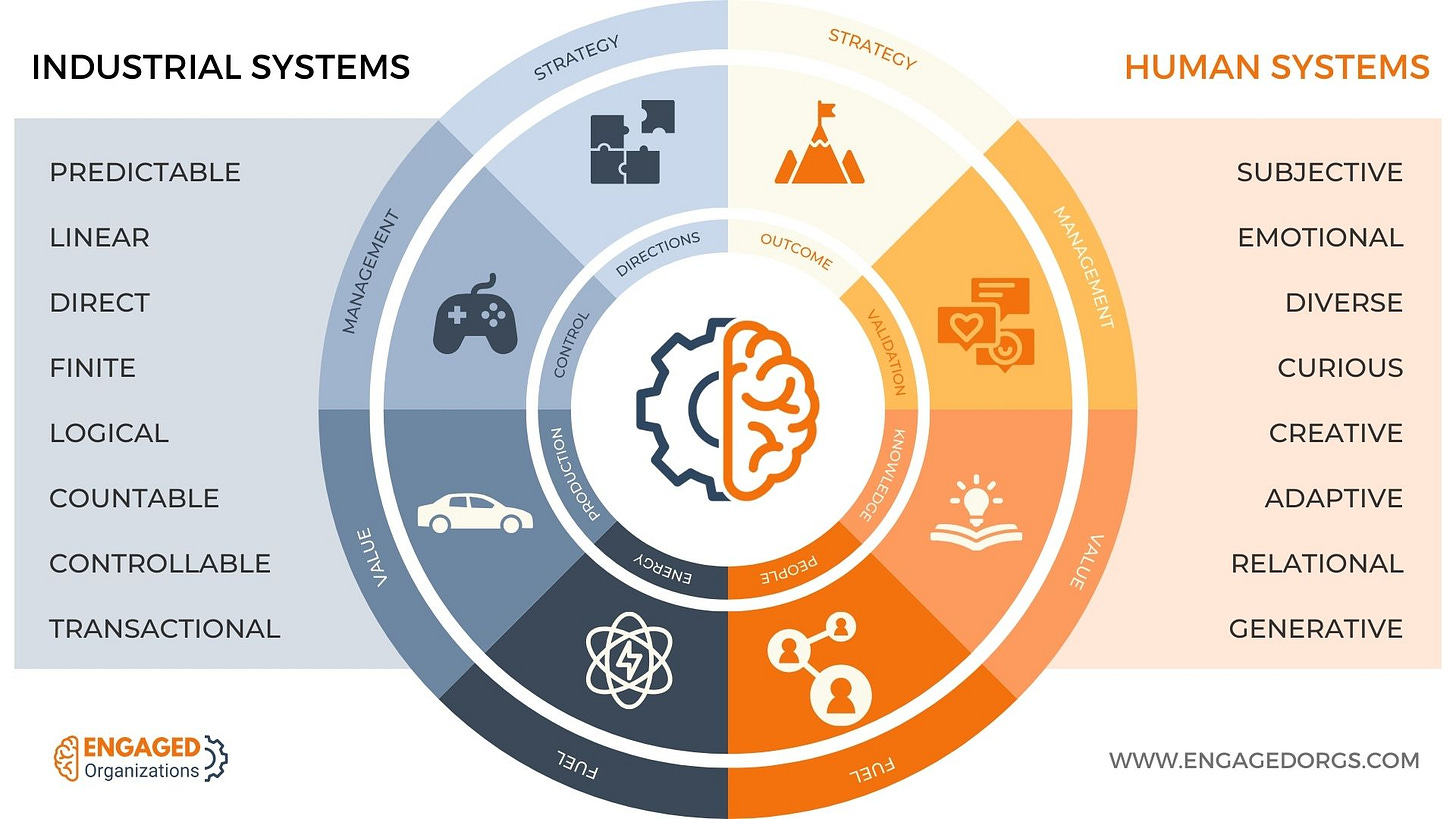Pathology or Humanity?
How we raise and educate our children—and its effects—tells us a lot about our culture. These parenting norms reveal who we are and determine what is possible for our children.
I am in a group for parents of neurodiverse children, and someone asked what makes a good educational environment for children with Pathological Demand Avoidance, a condition first articulated in the 1980s, which has gained attention in recent years. I was not familiar with it when my daughter was small, but she was a child who would not be told what to do - and her reactions to it were intense. She had a strong sense of personal agency and integrity.
When my daughter was a preschooler, a friend who had a child of the same age responded to one of my parenting struggles by saying, “Sometimes you have to break their little spirit.” While it summed up the implicit orientation of how many of us were raised - to obey parents and other adults - its directness shocked me.
I don’t like being told what to do either, although I don’t think as a child I objected as overtly as my daughter. Regardless, the verbalization of this parenting approach was a gift because it helped my husband and me make an explicit choice to avoid “breaking her spirit.”
To avoid telling my daughter what to do, I had to interact with my daughter the way I would a consulting client, using the Socratic method to help her reach her own conclusions, like deciding to put on her shoes so we could get to daycare on time. It was exhausting as a parent, but it preserved her integrity and avoided meltdowns. While avoiding meltdowns was our goal, it also led to constant tiny learning opportunities, since I had to prompt her thought process until she understood what was needed and why. It also forced an ongoing negotiation of our relationship and its power dynamics. I had to earn her respect rather than assume it or try to force it with control. It required me to learn to play metaphorical chess when most parents could get away with playing checkers, because their kids were less reactive.
By refusing to be controlled, my daughter demanded a relationship of equals, retaining independence while choosing how to collaborate. This equity in relationships is a skill many adults struggle to navigate. Too often, in order to make things easier, one person subverts their interests, energy, or resources, or rely on traditional roles and hierarchies. Relationships of equals require more effort in the short term and ongoing negotiation, but they result in people who maintain their integrity, feel respected, and are free to make their own choices.
So, is refusing to be told what to do pathological?
Is self-determination pathological?
My daughter’s reaction to being told what to do was certainly more intense than for most people, but does anyone like to be told what to do? In my experience, no. From my perspective, that makes it the opposite of pathological; it is human nature. What was different for my daughter was two things:
Neurodiversity increases sensitivity, allowing her to feel conflict and friction that others might not notice or feel as strongly. This sensitivity also increases intelligence and insight.
We made it OK for her to react authentically because we did not punish her for having negative emotions or for disagreeing; we made it safe to resist. Over time, feeling safe to resist gave her a deep sense of security.
Leadership Is Resistance
Leadership is the capacity to see a different future and convince others to pursue it, all of which requires negotiation and clear communication. Because leadership is about seeing opportunity and potential where nothing exists, it could be considered a form of art - and it requires resisting existing realities in some way. Leadership also relies on relationships, which are stronger when boundaries are clear.
Resistance is typically viewed as something negative; I think that is largely because resistance is often accompanied by anger or accusations. However, the lack of resistance, ironically, makes relationships harder. It is impossible to negotiate with someone who does not assert their boundaries or articulate their needs, because it’s unclear what they want or what motivates them.
Poor leadership skills result from the inability to think independently, understand intrinsic motivators, and protect one’s own integrity - all signs that a person is looking for validation and direction externally. In the 1950s, Erich Fromm did groundbreaking research to understand how the Nazis gained so much power and what lead to what he called the “authoritarian personality.” In the intervening years, that research has been extended and challenged but it contributed to understanding the impact of how children are raised on how they think and act as adults. A more entertaining and equally insightful piece by Dorothy Thompson written for Harpers Bazaar in 1941, Who Goes Nazi? connects people’s personality, identity, economic position, and education to their likelihood of becoming authoritarian; interestingly, it addresses some of the critiques of Fromm’s work.
Our ability to think and act independently is critical for leadership, progress, and excellence, but it is increasingly at risk as technology optimizes our industrial systems, accelerating the standardization, compliance, and production for which it was designed.
The Rise of AI and the Pathology of Humanity
Generative AI is the latest example of technology that is accelerating the systemic disappearance of humanity, and it has taken the world by storm. Last week, I heard a case study from Visa about how they saw 90% adoption of AI by employees within a year of its introduction. That is impressive speed, even by the standards recently set by social media and smartphones.
This technology is accelerating the industrial structure of our education system as with every organization. It is distilling education into a series of transactions that undermine the very students it purports to support. Students are using AI at high rates, which is alarming to educators, not just for its implications on learning but for how quickly students are developing a dependence on it.
This example suggests to me that students fear being unique - they seek assurances that they are doing their work ‘correctly.’ By using AI, they can avoid vulnerability and accountability, which provides short-term emotional security even if its use is never apparent to others. The longer-term harm, however, is that they avoid practicing vulnerability and in tiny increments, give up opportunities to learn how to lead. They are fearful, often correctly, that their own humanity and its uniqueness will be judged as insufficient.
This standardization of humanity is happening in part because college education is increasingly seen—and pressured to be—job training. I was surprised to find just how many universities had Supply Chain Operations majors, for example. Ironically, many professions are disappearing or being fundamentally altered due to technology, and an undergraduate degree that is so closely tied to one profession seems shortsighted.
Humanity Is Disappearing
People are part of an organic system, in a world of institutions built for industrial systems that optimize capitalism, machines, and technology. The rigidity that increases the efficiency of industrial systems diminishes excellence in organic and human systems.
When we try to standardize people, the result is mediocrity, not excellence.
Historically, the majority of people in the world have worked producing goods, much of which can now be done by machines and technology. This profound shift in the work people do gives us the opportunity to allow humans to be human again - but only if we understand that human systems are fundamentally different than industrial systems and that they need a different operating model to thrive.
In industrial systems, governance acts as a cage, controlling for risk and variability. In human systems, that control prevents the worst behaviors but throttles excellence, creating a system that ensures mediocrity.
Humans need trellises, not cages, that support growth without forcing compliance or repetition.
Organic systems are complex and ever-changing. The transparency we now have is bewildering and scary for those who don’t know who they are or have practice being vulnerable; it overwhelms them as they try to find the ‘correct’ answer from others. Many have been told what to do and been forced to comply for so long that, as Erich Fromm identified, they fear freedom.
For those who know themselves, however, the chaotic environment is not as troublesome. Those who know what they want and care about have no need to reconcile the chaos in others or find one correct path. Instead, they focus on the things that matter to them, know there are many ways to pursue it, can ignore unrelated noise, and don’t need to resolve conflicting points of view. They are focused and grounded from within on their own humanity, so the external environment is less likely to throw them off. Their humanity, however, creates more and more friction as organizations become industrially efficient. It seems those in touch with their humanity are the most likely to be exiled from organizations because of that friction.
Resistance is only pathological to those with an industrial lens on an organic reality; when people are forced into industrial systems, controlling relationships, rigid definitions of right and wrong, and little unstructured time to reflect and think.
If we don’t think differently about work, employment, education, and economic priorities, we will continue to increase harm to humanity, and we will build a world where the machines take over.
Designing Human Systems
Institutional governance was created for industrial purposes; companies, schools, and governments inherited a structured designed for production and mechanical efficiency. Institutions were once less efficient and had space for humanity to exist in the margins, but as technology codifies and accelerates it, our organizations increasingly limit human performance and potential.
Our greatest gifts as humans are our ability to connect, inspire, and empower one another - our capacity to create meaning. Meaning is what creates value and increases financial margins. It turns out, ice cream with a purpose, is both better ice cream and more compelling than ice cream without - just ask Ben & Jerry’s.
We already have a model for human systems in communities, whether those are clubs in school, churches, professional groups, or informal networks. They don’t lack governance and structure, but they also don’t force compliance - people choose how and when they participate. People participate because these communities help them realize their values, have fun, and connect with others - they are joyful and engaging.
In contrast, Industrial systems make collaboration hard and contentious because they force us to resolve conflicting perspectives even when there is no objective reason to do so. We each have diverse perspectives, and the differences are what pique others’ curiosity, motivate learning, and energize relationships - all the things that contribute to flow rather than friction. Diversity, not standardization, is what generates excellence in human systems.
The organizations that create operating systems designed for human systems are the ones in which knowledge, creativity, engagement, and meaning will thrive - and we will all be better for it.








